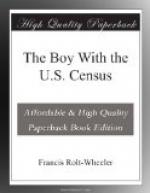“Yes, Mr. Burns,” the boy answered. “Eleven-fifty P.M., Tuesday.”
The opportunity was one which Hamilton had been coveting, for he felt that if he only had a chance to get at the city methods he would have covered almost the entire ground of the field-work of the Decennial Census, and while he was sorry to leave his Porto Rican friend, still the novelty appealed to him greatly, and in spite of his former chief’s mathematical conversation, Hamilton was genuinely fond of him.
“I’ve been wondering, Mr. Burns,” the boy said, as they stood in the great concourse of the Union Station at Washington, “whether there would not be a very large number of protests about census figures,—people always seem to have such an exaggerated idea of the size of their own towns.”
“There is to some extent,” Burns replied. “I think something like a hundred places filed protests in this last census.”
“Then I read something, too, about census frauds,” Hamilton said, “soon after the taking of the census, in which it was suggested that some enumerators—who were paid per capita—had bolstered up the figures in order to get more out of it.”
“There was a little of that,” the Inspector said, “but by far the greatest amount of fraud was due to the desire on the part of the inhabitants of a town or city to make the place appear larger and more important. Tacoma, Washington, was the most flagrant example of this, why, they padded 32,527 names there, and even when the Census had made a recount they tried to repeat the same performance, complaining of the results and demanding a second recount.”
“Was this granted?”
“It was,” the Inspector replied, “largely in order that the Census Bureau itself might have an opportunity to check the correctness of its methods. The second recount was performed by expert statisticians and with extreme care.”
“And how did it come out?” the boy asked.
“It substantiated the first recount in every way. It was, indeed, a wonderful object lesson in showing how small is the margin of error in the United States Census.”
“But was there really much fraud among the enumerators and supervisors, Mr. Burns?”
“With perhaps one exception, no criticism could be made of the supervisors, but you can’t have 70,000 enumerators, chosen for temporary work, and expect perfection! There was quite a little over-counting, caused by entering hotel transients as having permanent residences, by numbering citizens both at business and home addresses, and the constant difficulty of the floating population. Deliberate frauds were very few; where trouble was found it was usually discovered to have been due to the unauthorized activity of committees of boards of trade or other commercial organizations, giving lists of names all ready to be copied on the enumerator’s schedule, which the latter did not take the time and trouble to verify.”




